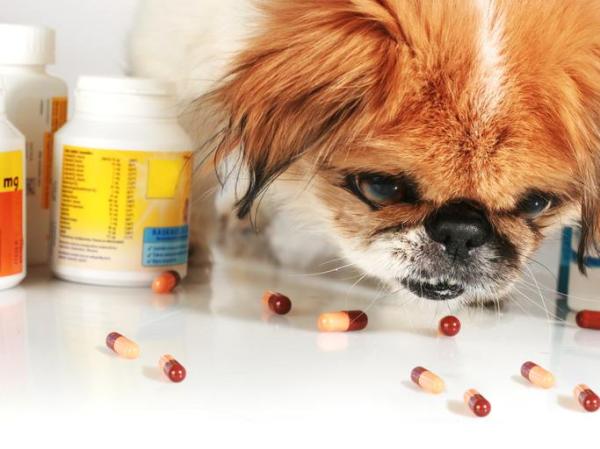
Vitamin K is one of the vitamins that both dogs and humans need to consume in their diet to stay healthy. This fat-soluble nutrient is crucial for the synthesis of clotting proteins in our dog's body that allow them to recover from injuries. In other words, vitamin K has the ability to clot blood, which prevents blood from flowing from wounds or injuries, which can be fatal.
In this AnimalWised article we explain what vitamin K is good for in dogs, its benefits, its functions and how to administer it.
What is vitamin K?
Vitamin K is a fat-soluble vitamin that is essential for proper blood clotting and also plays a role in bone maintenance. In particular, it is an essential cofactor for the synthesis of clotting factors that the liver must produce. This means that spontaneous and uncontrolled bleeding can occur if there is not enough of this vitamin in the body. In other words, without vitamin K, clotting time is prolonged because the necessary components are not formed. When bleeding occurs, it either does not stop or it takes a very long time to stop.
It is metabolized in the liver, where it is stored for a short time, and excreted through bile, which enters the digestive tract, and through the urine. Vitamin K is ingested with food or produced by bacteria in the digestive tract, but sometimes vitamin K for dogs must be administered to treat health problems.
There are two forms of vitamin K. The first, produced by plants, is K1 or phytonadione. Vitamin K2 or menaquinone, on the other hand, is produced by bacteria in the intestines of mammals.
Functions of vitamin K in dogs
Vitamin K for dogs, especially K1, is used in cases where there is a risk of bleeding orwhere there is a disease that prevents the normal absorption of the vitamin. This is the case with liver disease, but also for the prevention and treatment of bone weakness or osteoporosis.
It is also used in dogs with hemophilia, a disease characterized by an inherited defect that prevents normal blood clotting. In addition, this vitamin is administered to dogs treated with medications such as anticonvulsants, sulfonamides, or NSAIDs, since their vitamin K levels may decrease.
However, the best known use is in the treatment of poisoning by rodenticides.
Vitamin K for poisoned dogs
Vitamin K is often administered in cases of poisoning by rodenticides such as warfarin, which effectively block the hepatic utilization of vitamin K. The purpose of these poisons is to prevent the body from producing clotting factors. Treatment with vitamin K has been successfully used as an antidote in dogs poisoned by rodent venom.
These are the most common symptoms when a dog has been poisoned with rodent venom:
- Pallor or a bluish tinge to the skin and mucous membranes of the dog.
- Hemorrhage in the form of vomiting.
- Bloody urine or bleeding in the stool.
- Nasal, rectal, gingival, or internal bleeding.
Internal bleeding may result in sudden death of the dog. In these cases, administration of vitamin K is essential as part of the treatment to try to save the dog's life.
In the event of poisoning, it is very important to see a veterinarian immediately. If you want to know more about what to do if you suspect your dog has been poisoned, continue reading this other article about poisoning in dogs.

How to administer vitamin K to a dog?
The dosage of vitamin K tablets is 5 mg per kg weight of the dog per day. Treatment may continue for a week or even a month or more, depending on the type of poison the dog has ingested.
Vitamin K must be given until the toxin is eliminated from the body and blood clotting returns to normal. Stopping the vitamin before this time would cause a relapse. The veterinarian will monitor the dog's clotting status and decide when to stop treatment.
In situations where the dog's life is in danger, the veterinarian will most likely administer vitamin K subcutaneously, intramuscularly, or intravenously. Once the dog has recovered, the vitamin can continue to be administered orally.
Film-coated tablets are available and may be divided to facilitate dose adjustment for each dog. Administration is recommended after the meal. There is also vitamin K in syrup, as a dietary supplement. In this case, the dose is 1-2 ml per kg of body weight per day, preferably before meals.
It should be noted that vitamin K takes a day to work, regardless of the route by which it is administered. Remember that new proteins must be synthesized, as the already circulating clotting factors are not altered by the treatment.
If you are thinking about giving your dog vitamin K to improve their overall health, we advise you to first consult your veterinarian.
Food sources of vitamin K for dogs
In most dogs, sufficient vitamin K is produced by their own intestinal bacteria, so they need to ingest very little from food. However, there are safe dietary sources of vitamin K for dogs if they need more.
Most vitamin K1 is found in green leafy plants, while vitamin K2 is found in fermented foods that contain probiotics and in various animal products. Even though these foods are safe for humans, they may not always be the best choice for your dog. Safe sources of vitamin K for dogs include:
- Broccoli
- Brussels sprouts
- Kale
- Cabbage
- Spinach
- Swiss chard
- Carrot
- Eggs
- Green beans
- Green peas
- Hard and soft cheese
- Pork chops
- Bacon
- Chicken meat
- Liver of beef or pork

Side effects of vitamin K in dogs
Studies conducted with this vitamin have not shown any adverse effects. Even at higher than recommended doses, no signs of intolerance have been noted. However, there have been reports of hypersensitivity reactions during treatments with injectable vitamin K at high doses. Administration of vitamin K1 in this manner can also cause bronchospasm and cardiac arrest, so oral forms of the vitamin are preferred.
However, synthetic vitamin K3, or menadione, is known to be toxic and can cause an allergic reaction, hemolytic anemia, and liver cell damage. Your dog is unlikely to come into contact with this form, since it is banned for over-the-counter sale in most countries.
Contraindications of vitamin K in dogs
As mentioned above, there are no known side effects associated with oral administration of vitamin K in dogs. However, its use in pregnant or lactating dogs is avoided because there are no studies demonstrating its safety. This vitamin is known to cross the placental barrier, although research to date has not found any damage or malformations in pregnant puppies.
Caution should be exercised in puppies, dogs with hereditary hypoprothrombinemia, renal dysfunction, excessive anticoagulation with heparins, and hypersensitivity to vitamin K.
If you want to read similar articles to Vitamin K for Dogs, we recommend you visit our Healthy diets category.
- Carlson and Giffin. (2002). Canine Veterinary Practice Manual. Madrid. Editorial el Drac.